A version of this article first appeared in the June 2021 issue of Autism Spectrum News
Networking works
Most people find employment opportunities through a network of people they know. It is well documented that professional networking is an important investment in time to begin and grow one’s career. (1) In fact, the U.S. Bureau of Labor Statistics indicates that “85% of jobs are filled by networking making it a critical skill to develop on the road to employment”. (2)
Networking allows people to establish and nurture long-term mutually beneficial relationships, learn about career options and developments, guide skill acquisition and development, maintain an awareness of changes in a particular industry and potentially lead to job opportunities. (3)
Even in the best of circumstances, for a person with confidence and the ability to articulate one’s thoughts and respond appropriately to social cues and nuances, networking can be challenging. For adults on the autism spectrum, networking is counter-intuitive and extremely challenging. By definition, persons diagnosed with autism are likely to be challenged by social communication and have difficulty understanding the social cues that influence day-to-day interactions.
Networking requires actively listening to another person and then responding spontaneously to develop rapport. The art of networking is one of the harder skills to achieve. Yet the value of networking is undisputed and a skill worth developing amongst job seekers with autism. We know that adults with autism specifically are a disability population that has an extremely low rate of employment. (4) Therefore, professionals serving adults on the spectrum need to implement a curriculum that specifically addresses the multiple challenges that autism presents in job acquisition and retention.
Teaching the skills of networking
Our professional team at Yes She Can developed a curriculum to teach networking skills that assumed some level of success, a plan to support significant preparation, and a commitment to our trainees offering them the dignity of risk. Preparing job candidates with autism for networking opportunities is multi-layered and cannot be rushed.
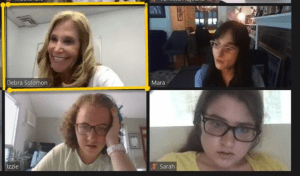 Our comprehensive curriculum consisted of a series of workshops over the course of four months to provide the tools necessary for people with autism to succeed in their networking efforts.
Our comprehensive curriculum consisted of a series of workshops over the course of four months to provide the tools necessary for people with autism to succeed in their networking efforts.
Workshops were created and presented in multiple-week chunks, scaffolding skills leading to networking opportunities. The workshops were broken down into the following topics:
- Exercises to enhance self-awareness of vocational preferences and interests including personal attributes and strengths, likes and dislikes, environmental setting awareness, need for direction, work hours, and modes of available transportation.
- Job exploration using videos and guest speakers from a variety of career avenues to help increase awareness of typical job responsibilities.
- Understanding the types of resumes used and completing a current resume.
- Understanding and using LinkedIn as a networking tool.
- Establishing a LinkedIn profile that accurately reflected each person’s strengths, work and volunteer experiences, job interests.
- Understanding the value of informational interviewing as a networking tool
- Developing and practicing appropriate interview and follow-up questions.
- Managing one’s own anxiety via the practice of skills in small group settings and in one on one settings.
- Developing an understanding of the concept of active listening and moving from a prepared script to responding to unexpected information or suggestion.
Getting to Know You: The Art of Informational Interviewing
To implement the segment on learning about and conducting informational interviews, Yes She Can sought people in early to mid-career stages. Yes She Can management worked with Volunteer NY to create a series of workshops with several of their corporate clients who were interested in helping our trainees to conduct multiple informational interviews with employees. Repetition is essential to learning any skill.
Two corporate partners of Volunteer NY, Regeneron and MasterCard, identified 18-25 employees in 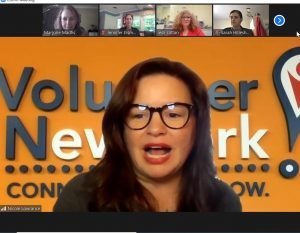 their organizations who were interested in volunteering their time to help participants with autism practice informational interviewing. The volunteer employees were self-selected and shared that they were motivated to participate for various reasons: because of their direct experience with a person with autism, an interest in learning more about autism, a recognition that people with autism are an untapped human resource for employment needs and/or a general interest in “doing good”. Several volunteer employees expressed a recognition of the role of mentors in their own career development and had an interest in “paying it forward”.
their organizations who were interested in volunteering their time to help participants with autism practice informational interviewing. The volunteer employees were self-selected and shared that they were motivated to participate for various reasons: because of their direct experience with a person with autism, an interest in learning more about autism, a recognition that people with autism are an untapped human resource for employment needs and/or a general interest in “doing good”. Several volunteer employees expressed a recognition of the role of mentors in their own career development and had an interest in “paying it forward”.
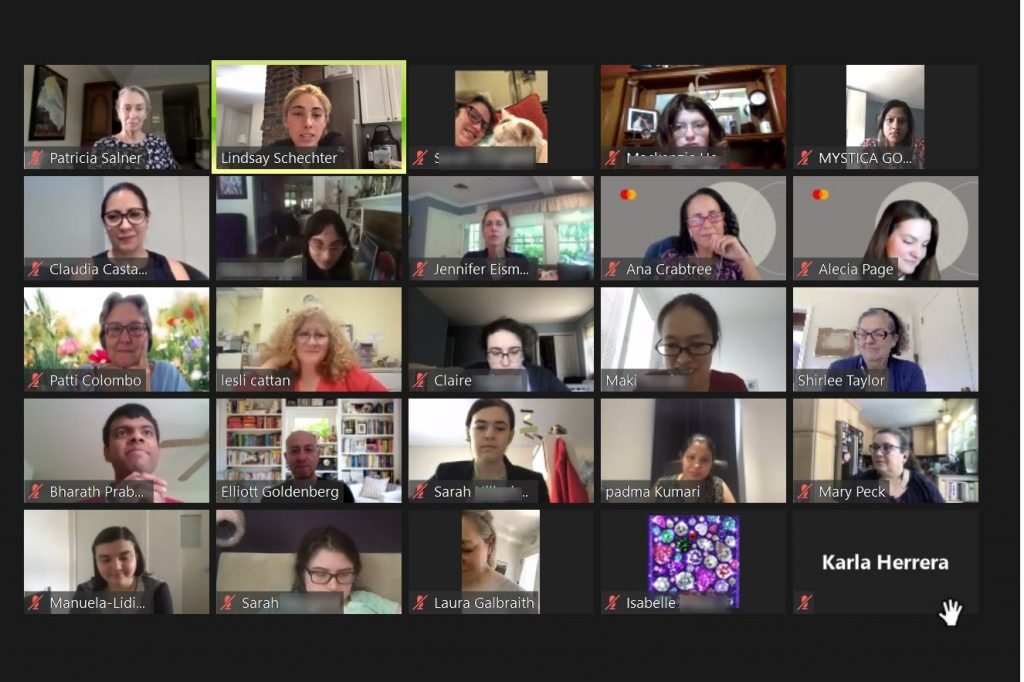
Yes She Can trainees meet MasterCard volunteers.
Volunteer employees were matched with a participant in advance of the informational interviews. All participants researched the person they were interviewing on LinkedIn. With Yes She Can coaching support, trainees developed specific, relevant questions in addition to the general interview questions that were identified during the workshop series on informational interviewing. Participants were provided multiple opportunities to practice with their coaches: asking questions, revising follow-up questions, listening for unexpected responses, being aware of body language and tone of voice.
Let’s Try It.
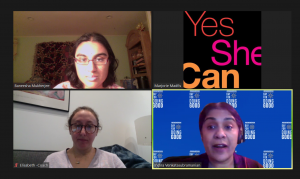
Baneesha meets with Indira, Associate Director of Publications at Regeneron, supported by volunteer coach Elisabeth.
A series of remote informational interviews were held over several weeks. Each interview included a trainee with autism, a volunteer employee, and a Yes She Can coach to support all participants in the interview process. Interviews were scheduled over Zoom for 30 minutes. While some volunteer employees were early in their careers, others were seasoned staff with senior-level positions. Every effort was made to match these employees with participants where there may be a shared interest.
Even when that was not possible, the expectation was that the experience of conducting an informational interview expands awareness of potential vocational fields, encourages adults with autism to practice appropriately engaging with strangers, expands one’s network, and helps to build self-confidence. And, by including a coach during each interview, the trainees reported feeling less anxious and had the opportunity to receive specific feedback about their interactions after the workshop.
Yes She Can!
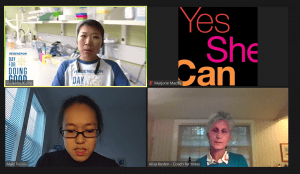
Yes She Can participate Maki, meets with Regeneron volunteer, Vivienne, a Research and Development Specialist, supported by volunteer coach, Alisa.
Both the volunteer employees and the participants described feeling a sense of satisfaction and intrigue in learning about each other and appreciation for the career lessons shared. More specific feedback included participants who reported feeling more confident in their ability to engage in appropriate conversation with others, feeling better prepared for future job interviews and an appreciation for their expanding network. Most participants in the informational interviews have connected with the volunteer employees via email or LinkedIn and in several cases have initiated a mentoring relationship
The series of informational interviews were completed in May 2021, and with time we will assess its impact on job exploration and employment. We do know that using this model, participants reported they have
- increased self-awareness about their interests and strengths
- gained perspective about challenges
- learned about mistakes and successes in others’ careers
- expanded knowledge of employment options
- understood the value of building networking skills
- increased sense of mastery and confidence
We are grateful to Volunteer New York, Regeneron, and MasterCard for participating with us in these great learning opportunities. Everyone benefited.
Networking is not only a skill for job-seeking but also for a richer life.
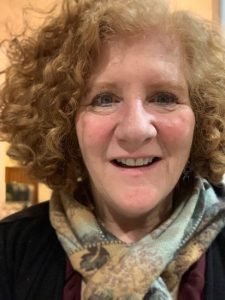
Lesli Cattan, LCSW, Director of Training Programs
References
- Augustine, Amanda, CPCC. CPRW, The Importance of Networking (and How to Do It Well), Top Resume
- US Bureau of Labor Statistics
- McIntyre, Michelle, Dec. 2020., 85% of Jobs are Secured Via Networking: Here’s How to Do it Right, Business2Community, {https://www.business2community.com/human-resources/85-of-jobs-are-secured-via-networking-heres-how-to-do-it-right-02368331}
- Roux, Anne M., Shattuck, Paul T., Rast, Jessica E., Rava, Julianna A., and Anderson, Kristy, A. National Autism Indicators Report: Transition into Young Adulthood. Philadelphia, PA: Life Course Outcomes Research Program, A.J. Drexel Autism Institute, Drexel University, 2015.
- Whetzel, Melanie, MA, Interviewing Tips For Applicants With Autism Spectrum Disorders (ASD), Journal of Vocational Rehabilitation, vol. 40, no. 2, pp. 155-159, 2014
To learn more about the art of networking, read Richard Bolles, What Color is Your Parachute
Leave a Reply